The music trio challenging AC/DC as Australia’s top music export
Rufus Du Sol have become wealthy, in-demand global superstars. Australia’s lords of the dancefloor are filling American stadiums as well as prime-time spots at some of the world’s biggest music festivals, including Coachella. But they’re far from celebrities.
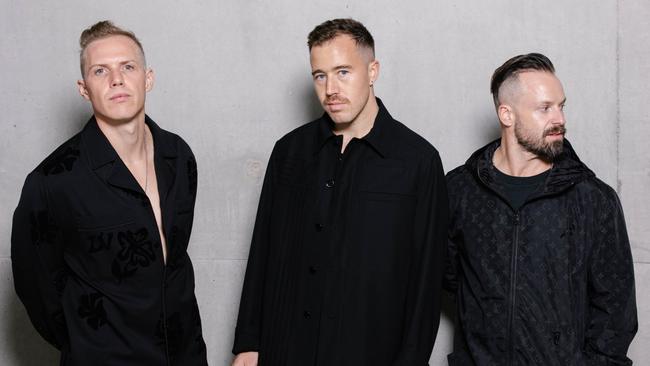
They make for a curious sight, these three men in black outfits, as they leisurely stroll around the luscious green grounds of Sydney’s Royal Botanic Gardens.
They’re not quite stopping to smell the roses, but two days before their newest body of work begins streaming into the headphones and stereos of millions of eager followers worldwide, they’re in a mood to reflect on how far they’ve come.
From humble beginnings, this trio has in recent years become one of the most popular Australian exports in the nation’s long, rich music history — and unless you’ve been paying close attention, it’s happened almost by stealth.
This was once their home, where booking and selling out headline gigs at inner-city venues such as the Oxford Arts Factory and, later, the Enmore Theatre were as big as they dared dream in the early 2010s. Once they ticked off those goals, though, they continued creating, and continued wondering how far their songs might take them.
Little did they know that, by the time they’d recorded and released four albums in eight years, the answer would include filling American stadiums and massive outdoor amphitheatres, as well as prime-time spots performing at some of the world’s biggest music festivals such as Coachella.
It’s an overcast Wednesday afternoon in early October when Review meets Rufus Du Sol. The sheer unusualness of these men in dark tones walking slowly up and down a maze of footpaths near the harbour while locked in deep conversation is enough to turn plenty of heads, but there’s almost zero chance of the band being recognised even in its former hometown.
Now in their mid 30s, these three friends have been making music together for most of their adult lives. For much of their career, they lived together, too: after moving from Sydney to Los Angeles eight years ago, they lived, worked and played under the same roof while creating their third and fourth albums.
They have become wealthy, in-demand global superstars, but they’re far from celebrities.
They’re neither rock nor pop stars, since their specialty is in crafting a unique blend of electronic music written and performed with drums, guitars, synthesisers, keyboards and vocals.
A more apt honorific, perhaps, is this: they are Australia’s lords of the dancefloor, whose most popular song happens to be a nine-minute epic.
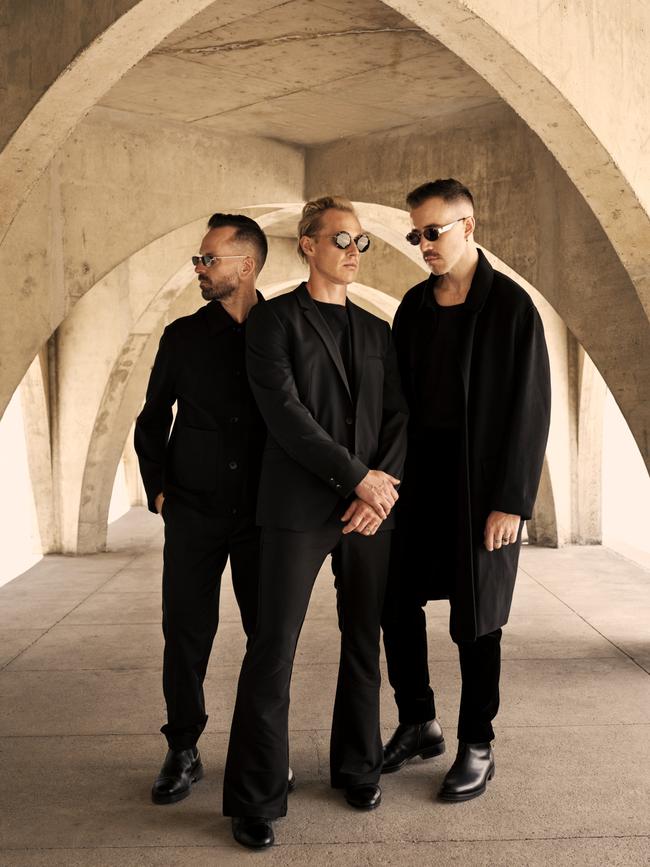
Together, they make beautiful, hopeful and uplifting music, which alternates between delicate and emotional, through to hard-hitting, beat-driven bombast, with Tyrone Lindqvist’s vocals acting as the human guide through what sounds like heavily processed, machine-created soundscapes.
But they’re not: every note, melody and rhythm heard has been filtered through the brains, hands and hearts of keyboardist Jon George, drummer James Hunt and guitarist/vocalist Lindqvist — three men who met in high school in Sydney, and have since exported their uniquely evocative, emotive take on dance music to the rest of the world.
“The story of Rufus Du Sol is of dedication and commitment to a vision that has been unwavering,” the band’s former live booking agent, Stephen Wade, told Review. “Right at the start, when we’d do shows for 200 people, the commitment was still there to put on a show. If they had a little bit of money, they spent it on lights.
“They knew what they wanted to be, and the kind of music they wanted to make — and they never wavered. I never saw them chasing hit songs or changing their style to appeal; they literally created their own tribe, or musical cult. That’s what works in the modern day. Once you got into that and you were connected, you were there for the journey.”
That journey has led to their fifth album, titled Inhale / Exhale, which they discuss with Review as they return to their homeland. At 15 tracks across almost an hour, it’s the band’s most expansive and cohesive collection yet.
After 18 months of careful writing, recording and tweaking conducted in two-week songwriting sprints — Lindqvist now lives in San Diego with his wife and their young son, while his two bandmates both live in Miami — they’re curious and perhaps a little anxious to see how the new work lands on fresh ears.
“I feel like a balloon just about to pop: we’ve got all the helium in it, and we’re rising right now,” says George, 38, with a giddy grin. “We’re album guys. We always have loved the process of buying a CD and getting something tactile; getting someone’s curated thoughts put in front of you, and you have to consume it as an album. We’ve spent a lot of time curating this one, and it’s really cool to think that people are going to be consuming it in a day or two’s time — or even tonight.”
Inside the Botanic Gardens at a green event space named The Calyx, a small group of people will tonight hear Inhale / Exhale for the first time in a world premiere album playback. The following day (Thursday), the trio will perform an intimate sunset concert on Sydney Harbour for which 3000 limited tickets were snapped up instantly — no surprise, given that its last national tour saw 50,000 tickets sold across two Sydney shows.
Rufus Du Sol is a major live attraction in Australia: its last run of headline shows here in late 2022 was witnessed by about 160,000 people, including 28,000 at the tour premiere in Brisbane, which made it the most popular tour of the year by an Australian act (and second only to US singer-songwriter Billie Eilish among all tours on our shores in 2022).
Attendance didn’t come cheap, either: with standard tickets priced at $136 and a limited run of VIP passes costing $307, those seven shows grossed somewhere in the region of $22m at the box office — an extraordinary feat for an act that’s largely unknown by most people aged 35 and above in this country.
Judging by the scale of the production — which featured enormous vertical screens looming above each band member, an artillery of stage lights, a blizzard of snowy confetti shot into the crowd near the finale, and fireworks exploding overhead to cap proceedings — plenty of cash was invested in ensuring a superlative show.
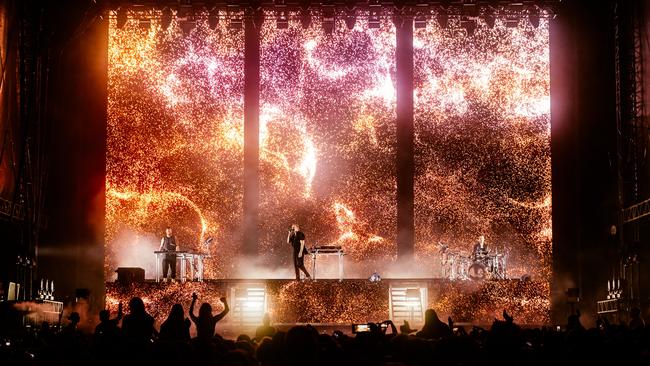
“It was a crowning achievement for all of Australian music to see an act selling that many tickets,” says Wade of the 2022 tour. “Selling 50,000 tickets in Sydney, and 50,000 in Melbourne? You’re at stadium level at that stage, and Australia would be lucky to have a handful of acts in the history of Australian music to get to that level; probably AC/DC was the first.”
But start thinking globally, as Rufus Du Sol did two albums ago, and that’s where things begin to get truly impressive for these three musicians.
Throughout 2022, the band’s run of 60 or so concerts supporting its Grammy-nominated fourth album Surrender was attended by about 700,000 people in 16 countries.
With an eye-popping crowd figure such as that, it’s hard not to get carried away with the scale of its live enterprise, as well as the potential, as the band’s audience is nowhere near reaching its ceiling.
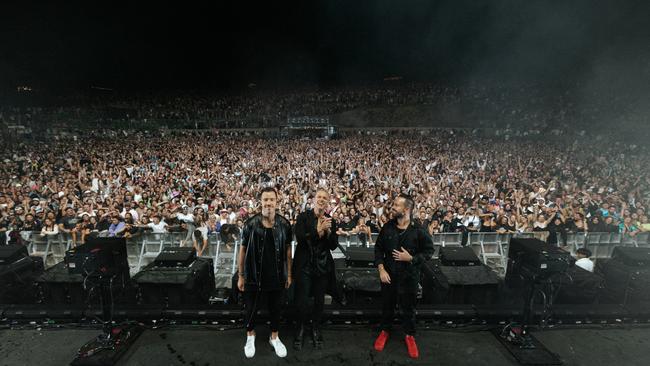
Though now a major drawcard in their adopted home of the US, the trio hasn’t yet played headline shows at major venues in Europe, although a run of festival appearances in that market has laid the groundwork for a still-growing tribe of fans.
“They could very well, 10 years from now, be the biggest Australian artists of all time,” says Wade, chief executive of Sydney-based booking agency Select Music. “It’s not outside their grasp, you know? It’d be hard to argue that there’s ever been anyone bigger, or made a bigger imprint internationally, than AC/DC. They have a chance to really challenge that mantle. I mean, AC/DC aren’t going to be around in 10 years’ time, playing shows – but Rufus Du Sol will be.”
One of the strangest aspects of the band’s evolution and cultural ascent is that the singer didn’t much care for electronic music in his youth. When playing covers in adolescent bands, he was much more drawn to songs by rock and metal acts such as Blink-182, System of a Down and Korn than anything featuring synthesisers.
What converted him was the sound and experience of seeing two of the nation’s premier electronic acts of the mid-2000s, The Presets and Cut Copy, and being drawn in by how they presented their songs live.
“Even though it’s very electronic, it felt like it opened the gateway to electronic music for me, because it was framed as a rock show,” says Lindqvist, 35, as we pace around the garden paths. “It lowered my guard. I think I had a preconceived idea of what electronic music was, and that just opened the door for me. There was so much to discover, and I fell in love with that world and the limitless possibilities that electronic music has.
“I feel like that’s been a really cool place for us to play in: you can use any synth, any drum kit, any guitar, any pedal — you can use anything at your disposal to make a song, and you’re not really limited to any one instrument.’’
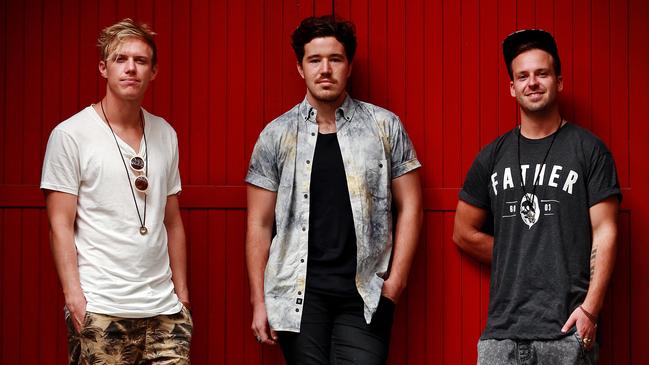
The adolescent tastes of Hunt, meanwhile, sat somewhere between those of former rocker Lindqvist and dance music fanatic George, who loved artists like Moby and The Chemical Brothers, and leapt into the world of DJing once he was old enough to gain entry to clubs.
At 34, drummer Hunt is the youngest of the trio. “One of the most formative periods for me discovering music in my late teens is when I got really into Radiohead, but especially (the British rock band’s fourth album) Kid A,” he says. “I got lost in that record, and I always come back to it in terms of it drawing from specific types of electronic music, but then transcending it.”
As for those preconceived ideas about electronic music that Lindqvist mentioned as a younger listener more interested in traditional rock ‘n’ roll instrumentation — what were they?
“My narrow-minded view on it was that there was no real soul or depth to the songs,” he replies. “Maybe they were very repetitive and I didn’t understand why they existed, because I hadn’t really had the experiences of getting to go to clubs, where you’re with a body of people in a trancelike state where you’re listening to something that’s fairly simple, at a really high volume — you can really hear the minute changes of a snare or a kick (drum), and it can be so incredibly euphoric, or so big. Until you have those experiences, it’s kind of hard to really understand them.”
As the singer and primary lyricist of Rufus Du Sol, it’s curious to hear Lindqvist reflect on his younger, blinkered view of the genre in which his band are now inarguable masters inspiring the next generation, just as The Presets and Cut Copy did for them.
Today, nobody could credibly accuse this band of lacking soul or depth in its electronic music, and his plaintive vocals — often centred on earnest matters of the heart, and emotional yearning — act as the lit torch through its often dark, moody dance arrangements.
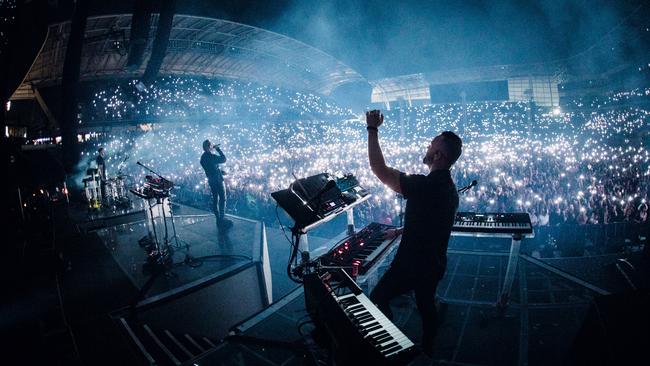
ARIA chief executive Annabelle Herd is an avid follower of their work, which has earned five ARIA Awards, including best group in 2021.
“A big part of their appeal is that the Rufus guys never shy away from being Australian, but have a global sound,” she tells Review. “As a huge fan, for me it’s that their music creates beautiful beats and vast melodic soundscapes layered with lyrics that are really romantic in a literary sense, and pack a strong emotional punch. It hits you right in the feels, and is a great soundtrack to life.”
Since its 2013 debut album Atlas, none of the trio’s songs have hit harder than Innerbloom, which appeared as the closing track of ARIA chart-topping second album Bloom (2016). Opening with ominous chords and moving through a bass-heavy midsection spiked with a stirring, dramatic lead synth melody, it’s the band’s most popular song on both Spotify (274m plays) and YouTube (152m plays).
Innerbloom is a deeply moving and ultimately euphoric song that demands unusual patience and attention from the listener: buy the ticket, take the ride. At nine minutes, it’s become something akin to a dance floor-filling version of Stairway to Heaven for millennials and Gen Z fans, all the way through to its open-hearted, vulnerable conclusion, wherein Lindqvist sings, “If you want me / If you need me / I’m yours”.
Stephen Wade has been quoted throughout this story, and while Select Music is no longer the band’s Australian booking agency — they’ve switched to global representation via CAA in Los Angeles, home to acts such as Bruce Springsteen, The Weeknd and Katy Perry — he retains a clear fondness for his former clients, who have evolved from a hardworking club act to something much, much bigger.
“When people go, ‘Why do people like this band?’ I’m always like, ‘Name an act in the world that will play a nine-minute song — and as soon as they start it, people go nuts and are in it for nine minutes’,” he says. “It’s incredibly unusual. They’ve got a lot of big commercial songs and great anthemic singalongs, and all the rest of it — but that’s the song that has an emotional connection; that is almost gospel-like in its approach. Collective mass: you’re playing something that puts 20,000 people together, all feeling the same thing. That’s their DNA.”
As we snake through the Botanic Gardens on foot, the musicians have the unusual experience of hearing their own music — including singles from their forthcoming album, such as Music is Better and Break My Love — playing loudly from a stage in the middle distance, as their crew tests the sound system for their concert the following day, at Fleet Steps near the harbour.
Asked if they like what they hear, Hunt replies, “The mix holds up!” The drummer’s broad, proud grin belies the 18 months that went into crafting this newest body of work.
As the sun goes down, the globetrotting trio surprises the 150 or so lucky fans and friends who have gathered at The Calyx to hear Inhale / Exhale: their appearance at the playback event had not been announced, though a handful of cluey fans had clocked them eating dinner at a pub nearby.
The three musicians are at ease while standing at centre stage during a brief live Q&A session about the album’s creation, while ringed by fans reclining in bean bags, drinks in hand; their average age edges towards late 20s.
Then it’s time for the world premiere. But rather than farewelling the crowd and retreating, there’s one more surprise: Lindqvist, George and Hunt opt to park themselves on bean bags near the centre of the circular space, crack open drinks, and sit with the rest of us to take in their newest creation with fresh ears.
The speakers play Inhale / Exhale at around 100 decibels; not quite as loud as the front-of-house mix at your average Rufus Du Sol concert, but still plenty loud enough to produce the addictive thump of the bass drum reverberating in our chest cavities.
Flanked by two small lighting rigs at either side of the stage, it’s a minor production compared to the major efforts seen at their concerts in recent years. Between songs, the crowd cheers and applauds for the singles they already know, with newly released Pressure earning perhaps the biggest cheer thanks to its storming lead riff and crushing bass sound.
As well, there’s the unique thrill of hearing great songs for the first time in the company of the artists who crafted them. As the tracklist plays through on a beautifully clear spring night, you couldn’t wipe the smile of serene satisfaction from the faces of these three album guys.
Inhale / Exhale is out now via Warner Music. The writer travelled to Sydney as a guest of Warner Music.


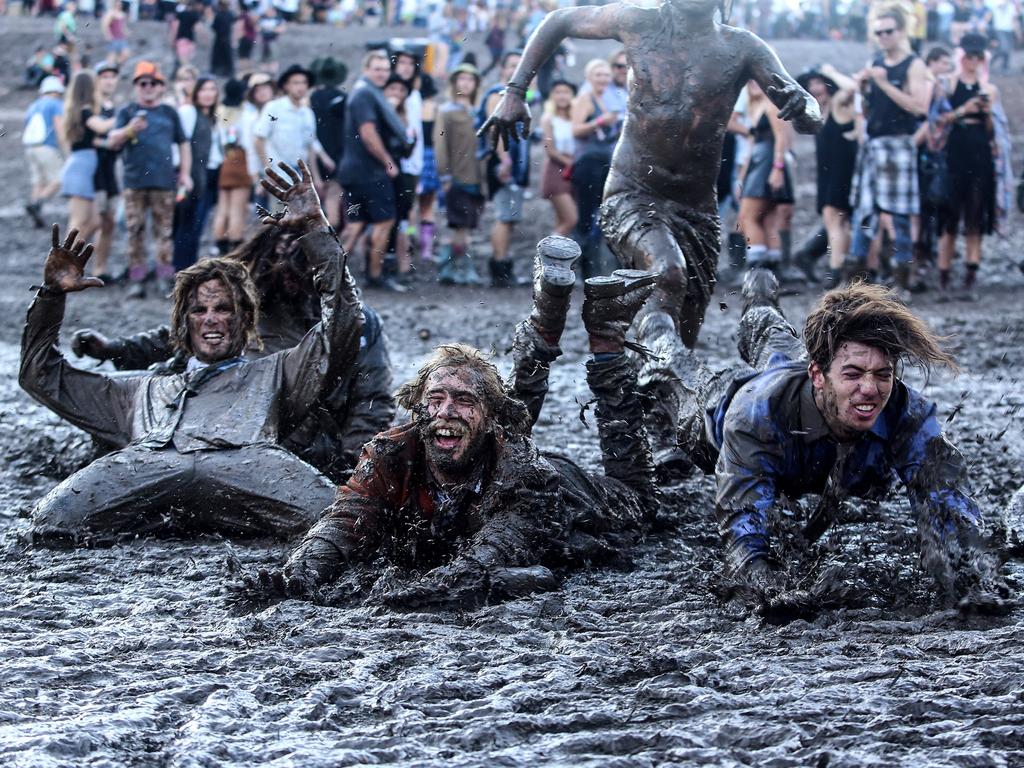


To join the conversation, please log in. Don't have an account? Register
Join the conversation, you are commenting as Logout